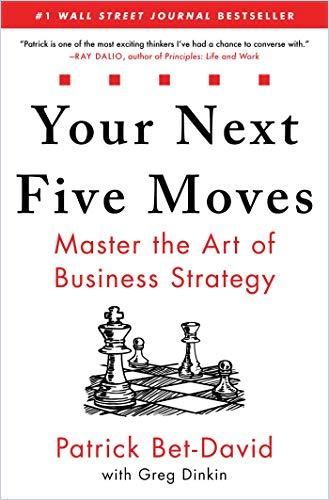Valuetainment founder Patrick Bet-David describes what it takes to think about your business like a chess master.

Make Careful Choices
Patrick Bet-David describes his career as far from the typical business success story. He barely finished high school, and then he became, in his own words, a party animal. After finally refocusing his energies, the young immigrant to the United States built a successful business. He describes his journey as embodying the American dream.
Bet-David started a financial services firm and created Valuetainment, a YouTube channel for entrepreneurs. He is also the author of Doing the Impossible and The Next Perfect Storm and the co-author (with Thomas N. Ellsworth) of Drop Out and Get Schooled and The Life of an Entrepreneur in 90 Pages.
Writing here with Greg Dinkin, Bet-David uses the analogy of chess to illustrate that you can achieve great things by thinking ahead, being logical and carefully considering each decision. In business and in life, he maintains, successful people think like chess masters and look five steps ahead, analyzing how today’s actions will affect them and their fortunes in the future.
Know Yourself
Figure out what motivates you. Identify your strengths and weaknesses and your passions and goals. For example, academics were not Bet-David’s strength. He was a subpar student who never went to college, but he was always ambitious.
Nothing matters unless you understand what makes you tick and where you want to be.Patrick Bet-David
He quit a job selling health club memberships after a manager reneged on a promise to reward his stellar performance with a promotion. In the aftermath of that disappointment, Bet-David listed his priorities: Success, respect and enough money to call his own shots.
Rocket Fuel
Bet-David explains that people often use personal tumult to fuel their ambitions. For example, he recounts that Elon Musk’s father frequently expressed low expectations for his son. Real estate mogul Barbara Corcoran built her empire after the man she loved dumped her and told her she’d never make it without him. Bet-David keeps a list of all the people who’ve doubted or insulted him because thinking of them motivates him to work harder.
If someone is winning at a higher level than you are, either lower your expectations to match your work ethic or increase your work ethic to exceed your expectations.Patrick Bet-David
The author insists that your purpose and motivation are yours alone, but he cautions you to know what you really want because chasing a dream that doesn’t match your personality is a road to misery.
Dispassionate Logic
Most successful people process information and then act strategically based on what they know. They identify a problem and then respond in a way that sets up a better outcome.
Most people struggle with this concept. When something goes wrong, they look for someone to blame. Or they ignore the problem by shifting attention to some sideline or distraction. In Bet-David’s eyes, that’s how victims respond. Successful people accept responsibility for a problem. Then, like chess players, they analyze possible strategies and pursue moves that bring the crisis to an end.
When you think five moves ahead, you prevent your ego from telling you that you can do it all alone.Patrick Bet-David
Bet-David recommends being aware of the warning signs of a pending problem. Then, if you face a challenge, ask questions, seek contrary opinions, stay curious, analyze your information and find a permanent fix. Don’t blame other people or your circumstances.
Expert Processors
When business problems arise, many people look for a scapegoat, for example, a bad boss or lazy employees. In contrast, master processors – people who think through problems carefully – take a more precise approach. They “solve for X,” a step-by-step method of breaking down a problem in search of its true cause, that missing X.
Processing deeply means going below the surface.Patrick Bet-David
Expert processors distinguish symptoms from root causes. They set aside bruised egos and hurt feelings, so they can sort out meaningful issues. They also differentiate the factors they can control from those they cannot. And when they make a mistake, they manage its consequences.
Build Teams
Many entrepreneurs think they’ve finished recruiting when a new hire comes on board. In truth, competitors often reach out to recruit from their rivals’ workforce, and that includes everyone on your team, new or established. In that way, recruiting is a never-ending process. Even after you hire people, you still must vie for their loyalty. Evaluate your company’s trajectory and your compensation and benefits package. If your competitors are offering a better deal, you are under the threat of having your workers leave. Profit sharing addresses this challenge. Give your people golden handcuffs to ensure their loyalty.
When you refuse to process issues, you live a lie and pay the consequences.Patrick Bet-David
Hire a trusted adviser to hold you accountable. Facebook’s Mark Zuckerberg, for example, had Sean Parker and, later, Sheryl Sandberg. Warren Buffett had the late Charlie Munger. Designate someone whose personal style differs from yours. If you’re an introvert, find an extrovert.
Fire Poor Performers
Bet-David tells of hiring an assistant who was terrible at the details of his job. When he realized the young man had never really become committed to the work, Bet-David fired him and urged him to follow his passion, instead. The former assistant then traveled the world as a surfing instructor.
Bet-David believes in the old HR maxim, “Hire slowly, fire quickly.” He explains that you must fire people gently, make it quick, clearly communicate your reasons, let the fired workers know you appreciate how harsh the experience is and acknowledge their strengths. Never delegate the act of dismissing someone you hired. If you bring someone into your company, and it becomes necessary to fire him or her, then you should do it yourself – face to face.
Leverage Strategy and Scale
Citing Microsoft, Apple and Amazon as start-ups that became giants, Bet-David credits their ability to harness the power of scale. To build something that big, he says, you must understand various types of corporate growth and the functions that underpin them.
Just because you chose to become an entrepreneur, that doesn’t make you a visionary CEO.Patrick Bet-David
For example, linear growth comes from having sound, basic operating systems and developing your business based on solid sales. Exponential growth comes from leadership development and innovation.
Higher Performance
Bet-David admires champion National Football League coach Bill Belichick, who urges his athletes to strive for perfection even when they practice. His approach sometimes annoyed his players, but it fueled their confidence and success. Bet-David says he is also demanding of his people – in order to challenge them to do their best.
I apply pressure to my people until they become immune to it.Patrick Bet-David
The author urges you to avoid what he identifies as the Five Deadly Sins of Entrepreneurs: Spending unwisely, listening to the wrong people, ruling like a king or queen, losing your agility and comparing yourself to others.
Tough Guy Talk
Patrick Bet-David cites the game of chess as a model for his business strategies, particularly his tactic of thinking ahead five steps like a chess player. That covers his first theme, think before you act. His second main theme is taking responsibility. The author underscores his self-made success by portraying himself as a blunt-talking brave leader, tough boss and hard-nosed strategic planner. Bet-David offers some actionable advice, but it’s his personality and his personal story that most vividly carry his unspoken message: Do as I do.






